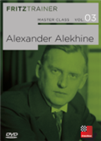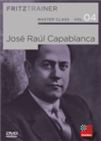An eventful life
Alexander Alekhine, born on 19 October 1892 in Moscow, died on 24 March 1946 in Estoril, was the fourth world chess champion in history after Steinitz, Lasker and Capablanca.
 On this DVD GMs Rogozenco, Marin, Müller, and IM Reeh present outstanding games, stunning combinations and exemplary endgames by Alekhine. And they invite you to improve your knowledge with the help of video lectures, annotated games and interactive tests
On this DVD GMs Rogozenco, Marin, Müller, and IM Reeh present outstanding games, stunning combinations and exemplary endgames by Alekhine. And they invite you to improve your knowledge with the help of video lectures, annotated games and interactive testsAlexander Alekhine was the son of noble parents. His father was a Duma deputy, his mother the daughter of an industrialist. After the revolution, Alekhine managed to leave the Soviet Union by marrying Anneliese Rüegg, a Swiss woman, in 1922. The couple had a son and lived in Berlin for a while. Alekhine moved to France in 1927, while his wife returned to Switzerland with their child.
In the 1927 World Championship match in Buenos Aires against Capablanca, Alekhine was a gross underdog, but he won what was up to that point the longest World Chess Championship match in history. He defended the title twice against Bogoljubow, lost it to Euwe and won it back in a rematch. After that, he held the title until his death in 1946, partly because the war no longer allowed world championship matches.
Alekhine met Grace Wishaar at a simultaneous match in Japan and married her in 1934. She was 16 years older than him. She had inherited a lot of money from her late husband and bought a castle in northern France, where the Alekhine couple lived until the Nazi occupation of France.
At the beginning of the Second World War, Alekhine, with his good language skills, had served in the intelligence department of the French army. After the capitulation, however, he allowed himself to be appropriated by the Nazis, had close contact with the Nazi bigwig Hans Frank, who was a chess lover, and took part in tournaments in occupied Poland and Czechoslovakia, among other places. In addition, Alekhine published articles on ‘Jewish and Aryan chess’. Alekhine would have liked to emigrate to America, which prompted him to move to Portugal at the end of the war, perhaps to find an opportunity for a crossing there.
Even before the war, Mikhail Botvinnik had held negotiations with Alekhine about defending his title and continued the contact after the end of the war. Alekhine wanted to play the match against Botvinnik. England was ready to host the match.
But then Alekhine was found dead in mysterious circumstances in Estoril on 24 March 1946. There are some inconsistencies in the accounts of his death, which fuelled many a conspiracy theory. Had agents of the Mossad or the French Resistance killed Alekhine? Or perhaps enemies of Botvinnik from the Russian Secret Service who wanted to prevent a match between Botvinnik and Alekhine? Or had Alekhine committed suicide?
Alekhine’s body was transferred from Estoril to Paris in 1956, where he was finally buried on the Cimetière du Montparnasse. FIDE erected an honorary tombstone for him.
Alekhine's life was overshadowed by political events in Europe. The Russian Revolution, the First World War and the Second World War had an immense impact on his life.
No matter how one may judge his personality, he was one of the best chess players in history. Moreover, his achievements at the chessboard emanate to this day.

 He was a child prodigy and he is surrounded by legends. In his best times he was considered to be unbeatable and by many he was reckoned to be the greatest chess talent of all time: Jose Raul Capablanca, born 1888 in Havana.
He was a child prodigy and he is surrounded by legends. In his best times he was considered to be unbeatable and by many he was reckoned to be the greatest chess talent of all time: Jose Raul Capablanca, born 1888 in Havana. Chess enthusiast Ludger Bröring (SF Lohne) was in Paris with his family in August and visited Alekhine’s grave. There he found the letter of a young fan deposited on the grave site — one that warms the heart.

The letter reads:
Pour le plus grand joueur d`echecs de tout le temps. De votre plus fervent admirateur qui aimerait bien suivre vos traces.
Aurelién 11 ans
20/08/22
In English:
For the greatest chess player of all time. From your most ardent admirer who would love to follow in your footsteps.
Aurélien, 11 years old
20/08/22
Select an entry from the list to switch between games
On this DVD GMs Rogozenco, Marin, Müller, and IM Reeh present outstanding games, stunning combinations and exemplary endgames by Alekhine. And they invite you to improve your knowledge with the help of video lectures, annotated games and interactive tests
Links
























